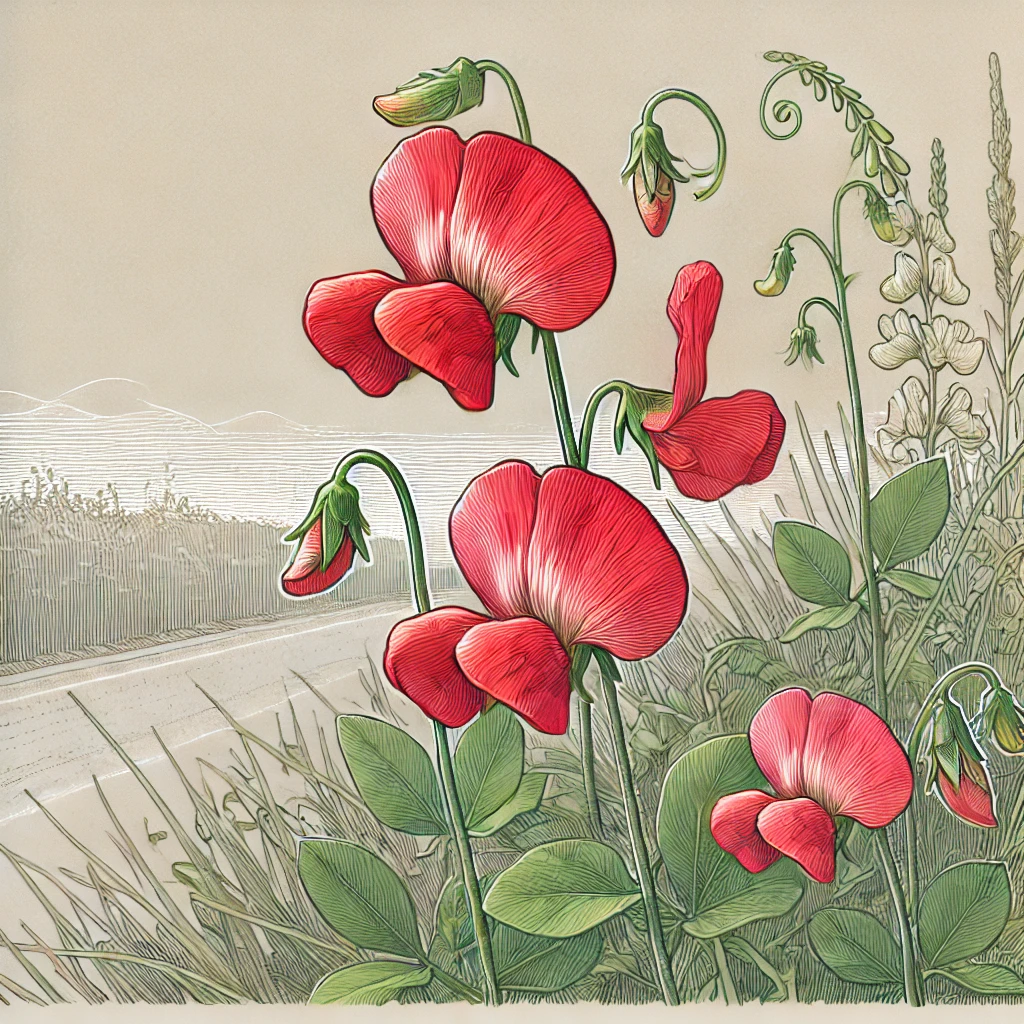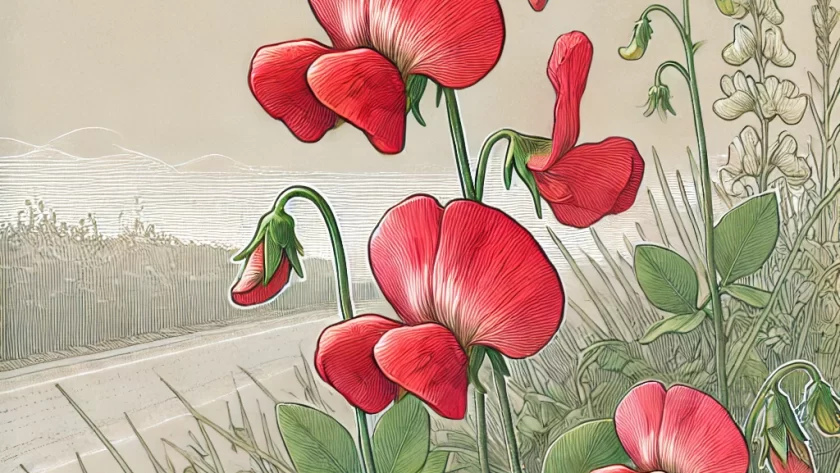赤いスイートピー [Akai Suītopī]
松田聖子 [MATSUDA Seiko]
Words:松本隆 [MATSUMOTO Takashi]
Music:呉田軽穂 [KUREDA Karuho]
Let me introduce Seiko Matsuda, one of Japan’s representative idol singers.
In the 1980s, she not only produced a string of hit songs but also caused a hairstyle trend known as the “Seiko-chan cut google” making her a charismatic figure who had a significant impact on Japanese popular culture.
Another notable point is her exceptional singing ability, which was outstanding for an idol. There are many idols who are beautiful but poor singers.
“Akai Sweet Pea” is one of her most popular songs, released in 1982 as her eighth single. The song was composed by Yumi Matsutoya, a singer-songwriter known by the nickname “Yuming.” However, for composition, she used the pen name “呉田軽穂 / KUREDA Karuho”, which was inspired by the old Hollywood actress Greta Garbo.
The lyrics were written by Takashi Matsumoto, a renowned songwriter who was originally the drummer of the rock band Happy End and provided lyrics for many excellent songs. Matsumoto has written many great lyrics for idol songs, and “Akai Sweet Pea” is one of his representative works.
Now, let’s read the lyrics.
春色の汽車に乗って海に連れて行ってよ
haru iro no kisha ni notte umi ni tsurete itte yo
- 春(はる) [haru] : spring
- 色(いろ) [iro] : color
- 汽車(きしゃ) [kisha] : train
- 乗る(のる) [noru] : ride
- 海(うみ) [umi] : sea
- 連れて行く(つれていく)[tsurete iku] : take
(translation) “Please take me to the sea on a spring-colored train.”
I will talk about this story, assuming the main character is a woman, based on the dialogue and situation.
The term “春色 / haru iro” isn’t an official word, but it’s beautiful. When people hear “spring color,” many think of cherry blossoms. So, “haru iro” might imply pink.

煙草の匂いのシャツにそっと寄りそうから
tabako no nioi no shatsu ni sotto yorisou kara
- 煙草(たばこ) [tabako] : cigarette
- 匂い(におい) [nioi] : smell
- シャツ(しゃつ) [shatsu] : shirt
- そっと [sotto] : gently
- 寄りそう(よりそう) [yorisou] : snuggle
(translation) “I gently snuggle up to the shirt that smells of cigarettes.”
“そっと / Sotto” is a type of Japanese onomatopoeia. It creates a gentle nuance.

何故知りあった日から半年過ぎても
naze shiriatta hi kara hantoshi sugitemo
あなたって手も握らない
anata tte te mo nigiranai
- 何故(なぜ) [naze] : why
- 知り合う(しりあう) [shiriau] : meet
- 日(ひ) [hi] : day
- あなた [anata] : you
- 手(て) [te] : hand
- 握る(にぎる) [nigiru] : hold
(translation) “Why, even though it’s been six months since we met,
you still haven’t even held my hand?”
I will follow you あなたについてゆきたい
I will follow you anata ni tsuite yukitai
I will follow you ちょっぴり気が弱いけど
I will follow you choppiri ki ga yowai kedo
素敵な人だから
suteki na hito dakara
- ついていく [tsuite iku] : follow
- ちょっぴり [choppiri] : a little
- 気が弱い(きがよわい) [ki ga yowai] : timid
- 素敵(すてき) [suteki] : wonderful
- 人(ひと) [hito] : person
(translation) “I want to follow you
because ,even though you’re a bit timid,
you’re a wonderful person.”
Sometimes lyrics contain English like this. It’s often English that is relatively easy for Japanese people to understand, but the content is usually included in the Japanese lyrics, so it’s not a big deal.
The atmosphere changes significantly when English lyrics are included, doesn’t it?
心の岸辺に咲いた赤いスイートピー
kokoro no kishibe ni saita akai suītōpī
- 心(こころ) [kokoro] : heart
- 岸辺(きしべ)[kishibe] : shore
- 咲く(さく) [saku] : bloom
- 赤い(あかい) [akai] : red
- スイートピー(すいーとぴー) [suītōpī] : sweet pea
(translation) “The red sweet pea bloomed on the shores of my heart.”
Sweet pea is a flower native to Italy. This song is believed to have increased its recognition in Japan. I haven’t seen it very often myself, though, lol.

四月の雨に降られて駅のベンチで二人
shigatsu no ame ni furarete eki no benchi de futari
他に人影もなくて不意に気まずくなる
hoka ni hitokage mo nakute fui ni kimazuku naru
- 四月(しがつ) [shigatsu] : April
- 雨(あめ) [ame] : rain
- 降る(ふる) [furu] : fall (rain)
- 駅(えき) [eki] : station
- ベンチ(べんち)[benchi] : bench
- 二人(ふたり) [futari] : two people
- 他(ほか)[hoka] : others
- 人影(ひとかげ)[hitokage] : silhouette
- 不意に(ふいに)[fui ni] : suddenly
- 気まずい(きまずい)[kimazui] : awkward
(translation) “Caught in the April rain, the two of us were sitting on a bench at the station.
With no other people around, it suddenly became awkward.”
何故あなたが時計をチラッとみるたび
naze anata ga tokei o chiratto miru tabi
泣きそうな気分になるの?
nakisōna kibun ni naru no
- 時計(とけい) [tokei] : clock
- ちらっと [chiratto] : glance
- 見る(みる) [miru] : look
- 泣く(なく) [naku] : cry
- 気分(きぶん)[kibun] : mood
(translation) “Every time you glance at the clock,
why do I feel like crying?”
“ちらっと / chiratto” is another Japanese onomatopoeia. Combined with “見る / miru,” it means “glance” instead of just “look.”

The second half of the lyrics might be confusing because the subject is omitted, but it means that I, not you, feel like crying.
I will follow you 翼の生えたブーツで
I will follow you tsubasa no haeta būtsu de
I will follow you あなたと同じ青春
I will follow you anata to onaji seishun
走ってゆきたいの
hashitte yukitai no
- 翼(つばさ) [tsubasa] : wings
- ブーツ [būtsu] : boots
- 同じ(おなじ) [onaji] : same
- 青春(せいしゅん) [seishun] : youth
- 走る(はしる) [hashiru] : run
(translation) “With boots that have wings,
I want to run through our youth with you.”
“青春 / Seishun” literally means “blue spring.”
青(せい / あお)[sei / ao] : blue
春(しゅん / はる)[shun / haru] : spring
If you look it up in a Japanese-English dictionary, it says “youth,” but it needs more explanation. It mainly refers to the period of adolescence but also encompasses the experiences and memories of that time. According to Japanese dictionaries, it compares the vibrant, hope-filled period of youth to springtime in life. Blue is also a color that represents youth and immaturity. Konosuke Matsushita wiki, the founder of Panasonic, said that “seishun” is the youth of the heart, and as long as you have energy, you can experience “seishun” forever.
Here, “I want to run through youth” is a metaphor for wanting to live a life full of dreams, hopes, and energy with you.
線路の脇のつぼみは赤いスイートピー
senro no waki no tsubomi wa akai suītōpī
- 線路(せんろ) [senro] : railway
- 脇(わき)[waki] : side
- つぼみ [tsubomi] : bud
(translation) “The buds by the railway are red sweet peas.”
好きよ 今日まで逢った誰より
suki yo kyō made atta dare yori
- 好き(すき) [suki] : love
- 今日(きょう) [kyō] : today
- 逢う・会う(あう) [au] : meet
- 誰より(だれより)[dare yori] : more than anyone
(translation) “I love you more than anyone I’ve met until today.”
Regarding the verb “逢う / au”(meet), some of you might be curious. In daily life, “会う / au” is commonly used, but in song lyrics, you might see “逢う” used instead. You don’t need to worry too much about it. However, for some reason, using these rare kanji can evoke feelings of coolness or sentimentality in the hearts of Japanese people.
I will follow you あなたの生き方が好き
I will follow you anata no ikikata ga suki
- 生き方(いきかた)[ikikata] : way of life
(translation) “I love your way of life.”
このまま帰れない帰れない
konomama kaerenai kaerenai
- 帰る(かえる) [kaeru] : return
(translation) “I can’t go back like this.”
心に春が来た日は赤いスイートピー
kokoro ni haru ga kita hi wa akai suītōpī
- 来る(くる)[kuru] : come
(translation) “The day spring came to my heart, there were red sweet peas.”
The expression “春が来た / haru ga kita” is used, which means “spring has come.” Many of you might understand this, but for those around the world, it is a metaphor for the end of a cold, harsh winter and the arrival of a warm, happy spring.
The word “spring” is used three times in these lyrics. Words that represent seasons evoke images of those seasons. Japan has very distinct seasons, and these words have a very poetic expression. Therefore, instead of saying “pink,” words like “春色 / haru iro” (spring color) are used.
Thanks for reading! Feel free to comment if you have any feedback or questions.
Follow me on X.



